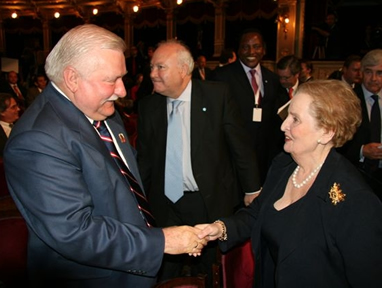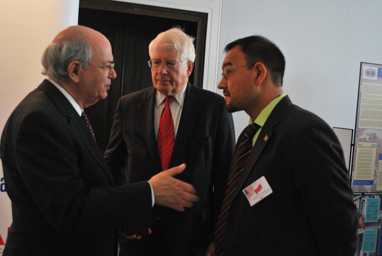|
New and Established Democracies Celebrate Past Successes and Look to the Future of Democracy Support

Former Polish President Lech Walesa and Madeleine Albright at the 10th anniversary meeting of the Community of Democracies
Community of Democracies Celebrates 10 Years
Representatives
from many of the world's established and new democracies came together
in Krakow, Poland, last month to celebrate the 10th anniversary of the
Community of Democracies, a global coalition
focusing today on meeting challenges to democracy and strengthening the
role of civil society.
NDI Chairman Madeleine K. Albright, who as U.S. secretary of state was an initiator of the organization, spoke at the gathering,
saying "those who are blessed to live in a democracy have an obligation
to repay that blessing by upholding free institutions and by teaching,
protecting, and cherishing democratic values." Read more»
Transatlantic Democracy Dialogue Begins
To
encourage stronger transatlantic ties on democracy support, senior U.S.
and European policymakers came together in Washington, D.C., for the
start of a two-year dialogue to discuss ways to fortify cooperation on
democracy and human rights. The dialogue is chaired by Albright; Jerzy Buzek,
president of the European Parliament; Javier Solana, former European
Union high representative for the common foreign security policy; and Vin
Weber, former congressman and former chairman of the National Endowment
for Democracy (NED). It is organized by NDI with primary
support from the European Commission and the NED. The
dialogue will, through a series of conferences and working papers,
produce actionable recommendations for improving democracy support
programs. Read more»
Commemorating the Frost-Solomon Task Force
| |
 Frost (left) and Rep. David Price (center) speak to Ibrahim Samadi, a participant in the parliamentary research service institute from Afghanistan.
|
The
benefits of transatlantic cooperation were celebrated in early June at a
commemoration of the 20th anniversary of the Frost-Solomon Task Force,
which provided assistance from the U.S. Congress to new parliaments in
Central and Eastern Europe emerging from communist rule. Its programs
were based on the principle that successful democratic transitions in
the former communist countries depended on the establishment of
effective democratic legislatures. Former Rep. Martin Frost, for whom the task force was named along with the late Rep. Gerald Solomon, attended the commemoration in Warsaw, Poland, along with
representatives from 10 of the former Soviet bloc countries. Read more »
Toward Better Parliamentary Research Services
Many
of the representatives from the original Frost-Solomon countries stayed
in Warsaw to share their experiences during a week-long parliamentary
institute organized by the House Democracy Partnership (HDP), a
successor to the task force. Representatives from 11 parliaments on
four continents, all HDP partner parliaments, took part in the institute
that focused on developing and strengthening parliamentary research
services. "Where democratic governance has taken root...commissions such
as ours can provide an added boost by sharing our own experiences, good
and bad," said Rep. David Price, chairman of HDP. Read more »
|
|
NDI Analysis: Burma's Electoral Framework is Fundamentally Undemocratic
A
new NDI report found that Burma's new election laws and constitution
have created a framework that is fundamentally undemocratic for the
first national elections to be held in the country since 1990. Based on
a legal and human rights analysis, NDI concluded that the election
process will not be a step forward and risks being yet another setback
in a country that has been governed by the military for almost half a
century. The process "is clearly designed to guarantee a pre-determined
outcome and, therefore, does not meet even the minimum of international
standards," the report said.
New Technologies Create Opportunities, Risks in Democracy Support
Speaking at a panel at the Krakow Community of Democracies meeting, NDI Chief Technology Officer Chris Spence explored the role of technology in democratic development and the challenges and opportunities it poses in closed societies. Spence also addressed the importance of using technologies in new and emerging democracies using examples from Afghanistan and Uganda.
He noted that while technology can provide useful tools, to be most effective they must be used to support well-organized "off-line" activities by civil society groups.
In Angola, Radio Program Connects 'Parliament and Me'
"Parliament
and Me," a new radio talk show in Angola, is working to establish a
connection between elected representatives and their constituents as the
country rebuilds after a 27-year civil war. NDI partnered with Radio
Ecclesia, a capital city radio station with a wide audience, to create
the weekly program, which educates citizens about the role of
parliament.
The
program also explores historical, political and legal issues that many
Angolans may not be familiar with, such as the origins of the Angolan
parliament, the laws it has passed and the impact of women parliamentarians.
In Macedonia, New Legislative Research Institute to Aid Lawmakers
Macedonia is working to establish a professional parliamentary research service that will
enhance the ability of its legislature to advance democratic
governance in the country. The parliament is undertaking a
three-year project to create such a service, which will help lawmakers obtain
the necessary information to generate and amend legislation, oversee
public expenditures and monitor how laws are carried out.
The
research service is funded by the Swiss Agency for Development and
Cooperation and implemented by NDI and its Macedonian partner, the
Institute for Parliamentary Democracy.
|
|
Iraqis Discouraged by Post-Election Government Negotiations
Iraqis
are becoming increasingly frustrated about the delay in the formation
of a new government and a majority of them believe that the country is
headed in the wrong direction, according to a recent public opinion poll
conducted by NDI.
Among
the survey's other findings, 42 percent of those polled thought Ayad
Allawi, representing the Iraqiyya coalition, which got the most votes in
the March 7 elections, should become the next prime minister, compared
to 14 percent who supported current Prime Minister Nouri Al Maliki. The most
important problem facing average Iraqis, they said, is delivery of basic
services.
Increasing Women's Political Participation Around the Globe
Part of NDI's core mission is working with women around the world to help them gain leadership skills and access to power:
Afghan Women Seek Major Role in Peace-building:
Women from 33 of the country's 34 provinces attended a symposium in
Kabul, Afghanistan, to find ways to ensure that women's rights are integrated into the government-initiated peace and reconciliation process. They listed 13 recommendations for the Afghan government to
follow to address women's needs.
Coalition Boosts Effort to Implement Gender Quota Law in Burkina Faso:
Last year the legislature in Burkina Faso passed a law requiring that
30 percent of candidates on political party lists be women. Now, a
coalition is suggesting ways to fully implement the law.
Middle Eastern Women Gain Political Inspiration in Wisconsin: A
group of young women from across the Middle East who aspire to
political careers spent two weeks at a leadership retreat in Madison,
Wisc., the culmination of a year-long Young Women Leaders Academy.
There, they learned from elected women leaders about public service and
political campaigns.
Mayan Women Train One Another to Increase Their Political Voice:
To help overcome the political and economic challenges facing Mayan
women in Guatemala, NDI has published a series of training guides to
help equip the women with the concrete skills they need to pursue
political leadership opportunities.
Global Network of Domestic Election Monitors Launches
In
more than 90 countries, millions of citizens have joined nonpartisan
election monitoring efforts to safeguard electoral integrity, hold
government accountable, mitigate politically motivated violence and
promote the right of citizens to participate in public life.
For the first time, those groups have joined together to form the Global Network of Domestic Election Monitors, which launched a website
this month that compiles thousands of documents, manuals and best
practices. As the site continues to evolve, domestic election monitors
around the world will be able to exchange information, form
relationships and continue to learn from each other.
|



